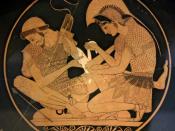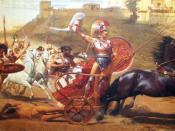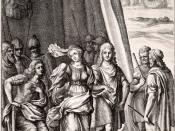From beginning to end of Homer's The Iliad, Achilles is portrayed as a man stagnant in his ways. He is arrogant, impatient, unforgiving, vengeful, and extremely stubborn, and these awful attributes never cease. Achilles' lack of compassion perplexes the present situation involving the Achaens and the Trojans by making it difficult to figure out which side is truly good and evil--both sides have good reason to fight. Even though Achilles is set in his ignorant ways, he does manage to do some good at the end of the story. However, even though he displays this act of unselfishness, the fury within Achilles causes him to remain the unchanging, selfish man that he truly is.
Agamemnon has just insulted Achilles in front of all the Achaeans, and, because of this incident, Achilles decides to return home rather than stay and fight with his own people. Returning to his tent, Achilles calls upon his mother, Thetis, a goddess, to beg Zeus for one favor:
'Persuade him, somehow, to help the Trojan cause, / to pin the Achaeans back against their ships, / trap them round the bay and mow them down.
/ So all can reap the benefits of their king-- / so even mighty Atrides can see how mad he was / to disgrace Achilles, the best of the Achaeans!' (1.485-490).
Rather than put his anger aside and continue to help in the battle, Achilles, being the best warrior, not only stops fighting, he summons his mother to ask Zeus to make his people suffer. His pride and arrogance overrun his rational thinking, and his attempt to make his own people suffer as he watches makes his disgusting behavior incomprehensible.
Zeus complies with Thetis' request, and the Trojans eventually force the Achaeans back to their ships. After...


